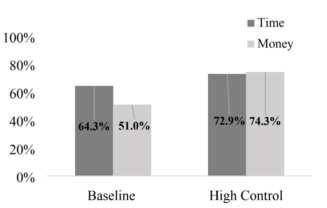Who Doesn’t Love Control?
Answer: Nobody doesn’t love control.
Double negative notwithstanding, we humans love control or the perception of it. Control is one of three key psychological needs, often referred to as a sense of autonomy and choicefulness: aka control.
People who feel a sense of autonomy over their giving are more likely to do it again. A pressurizing environment – e.g. face to face sale, telefundraising sale – may get an initial yes but with high likelihood of future “no’s”.
But how might my desire for control influence my choice to give time or treasure? Past testing has shown a human preference for giving of time over money and explained by the latter invoking mental pain that we try to avoid.
But, might our desire for control be the better explanation for giving time vs. money? And might the desire for control be less about the initial choice to give and more about a desire to control how that gift of my time or money is used?
New research says yes to both. The baseline condition shows a strong preference to give time instead of money with 64% giving time when given the option but only 51% donating when that was the choice.
The researchers (Costello, Malcok in a forthcoming issue of Journal of Consumer Research) did what all good researchers do, they built survey questions into the post-decision experiment to measure,
- sense of control
- perceived “pain”
- perceived effort
- warm glow and
- personal connection to the cause
as possible explainers of the time over money preference. They built a model and the only psychological factor left standing was a desire to control that which was given.
The obvious but still worth stating part? People correctly believe they’ll have more control over how their volunteer time is used than over how their financial donation is used. After all, I choose when I show up, when I leave and to some extent, what task I do and how much effort I put in, etc.
Most donations of money operate on the “trust” model, meaning I choose to believe my money was put to good use unless you give me reason to think otherwise.
So, what explains the “High Control” condition that got the money decision on equal, control footing with time? The information provided changed.
Researchers told those evaluating the give time/money choice that they could put their time/money towards an existing program or any other activity that furthers the charity’s mission.

At this point we expect the “but we can’t do that because [insert million reasons here]” refrain is crescendoing. To dampen it just a tad, consider this DonorVoice test.

The control had none of the highlighted copy whose “job” it was to foster a greater sense of perceived control. This isn’t restricted giving.
Result? The test increased average gift by $3.40 and gross revenue by 12%.
Kevin



It will take some nonprofit clients / those just adjusting to modern psychology and an infant in diapers: i.e., sales training / It was done right.
Yet it WILL take years to put into nonprofit practice/into the bloodstream/to institutionalize the wisdom just shared in this one Kevin post.
A prayer bubbles up: “Please stop being impeccably useful and dynamic and insightful. It’s discouraging for slow paddlers like me. Thank you for your extraordinary autopsies, though.”
¶ Is beloved/depressed a thing?